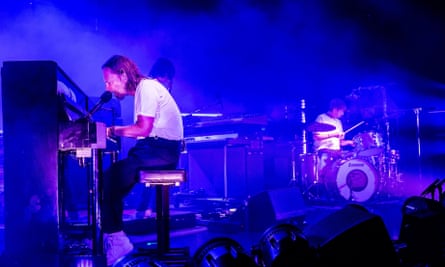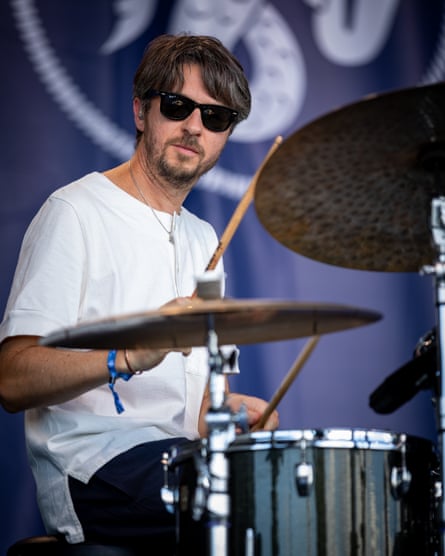It has been a head-spinning year for drummer Tom Skinner. He has been crossing the globe touring new albums simultaneously with London jazz group Sons of Kemet and with Thom Yorke and Jonny Greenwood as the Smile. Adding to the pressure, his partner is expecting their second child imminently. When we meet one bright Monday morning near his north London home, he keeps his phone on the table, ready to dash.
Skinner is remarkably calm amid the chaos, exuding the same groundedness that he brings to his collaborations. Onstage with Sons of Kemet, Skinner is loose-limbed as he battles through punishing rhythmic dialogues with second drummer Eddie Hick. Touring with Kano, he anchors a vast horn and string section; alongside trombonist Peter Zummo, his syncopated funk bolsters teetering melodies. “I’ve got to have a level of trust with someone before we even start playing, then it’s all about listening and allowing space for everyone to express themselves,” he says of these wide-ranging gigs.
Adding to his jammed slate, at 42, Skinner is now releasing his debut solo album. “I came around to the idea that using my name could allow me the freedom to own different sounds,” he says. “It gives me a blank slate to explore.” He recorded Voices of Bishara in just one day, accompanied by a quartet. Two of them are lifelong collaborators: he’s known saxophonist and Sons of Kemet bandmate Shabaka Hutchings for 20 years and bassist Tom Herbert since they met at school 30 years ago. Completed by saxophonist Nubya Garcia and cellist Kareem Dayes, the band created six tracks that progress from free-jazz fanfares of battling horns and textural percussion to menacing bass dirges and trance-inducing, overlapping melodies.
Skinner had a “classic acoustic jazz sound in mind for the album, so I set us all up in one room to record live”, he says. One pitfall was the instruments bleeding into one another – accidents that Skinner accentuated by using editing to emphasise his cuts and create loops from the best improvisatory flourishes. The mood lands somewhere between contemporary Chicago producer Makaya McCraven’s beat-splicing and Don Cherry’s spiritually influenced 70s melodies. “It was all about seizing the moment,” Skinner says. “I don’t feel precious about the music as long as it has immediacy.”
Skinner’s largely self-taught musical grounding is one reason for this lack of preciousness. Picking up the drums aged nine, he was enthralled by the early 90s grunge scene and metal bands such as Napalm Death before getting hooked on jazz through experimental New York saxophonist John Zorn and free jazz pioneer Ornette Coleman: he heard the same energy in the death metal scream in Coleman’s screeching saxophone lines. He and Herbert later played in the free London workshop Weekend Arts Club alongside multi-instrumentalist Dave Okumu of the Invisible. By 18, Skinner was gigging full-time and spending his weekends jamming at north London’s Jazz Cafe.
Buzz around the capital’s jazz scene has grown louder in recent years, but Skinner rejects the idea that it’s in any way new. “We came up on the shoulders of so many greats like Loose Tubes and the Jazz Warriors,” he says. “British jazz has always had its own identity and now it’s become very popular, which is wonderful. But this moment in time is just one branch of a much larger tree.”
As part of Sons of Kemet, which formed in 2011, Skinner has played a significant role in defining the current branch. When they sold out a raucous show at London’s Somerset House in 2019, they represented a new style of improvisation that had found a wider audience through its embrace of diaspora sounds. They recently announced that they will disband following their 2022 tour. But Skinner feels there is unfinished business. “We never rehearsed as a group; we developed our dynamic by always playing in front of an audience, which meant the music was constantly evolving,” he says. “It was a very intense band to play in but it’s not like the journey is over. I feel like there’s still more to do.”

Until then, he has a forthcoming US tour with the Smile to keep him occupied. He first worked with Greenwood when he and Hutchings played on Greenwood’s soundtrack to the 2012 film The Master. Was it intimidating getting the call to back one of the most high-profile partnerships in rock? “I was invited there for a reason and I feel confident enough to just allow the music to happen,” he says. “It’s like they have let me into their conversation and now it’s three-way.”
Skinner pauses to explain that he has to remain tight-lipped about the project since the band has collectively agreed not to give interviews. “Our conversation is ongoing,” he continues enigmatically. “There’s something very cathartic in getting people together in a room to make music. We put positive energy out into the world and that is ultimately what we desperately need.”
With the rest of the year planned juggling newborn duties and live dates – not to mention contemplating the next Voices of Bishara group album – Skinner isn’t slowing down. Nor is he stressed about it. “The music is there already, floating somewhere in the ether,” he says. “We just have to relax and let it come.”

